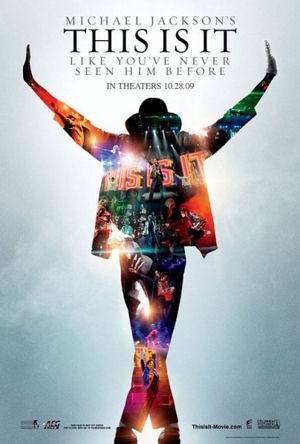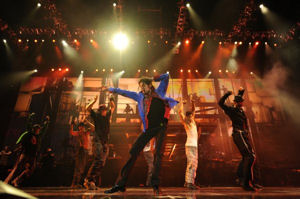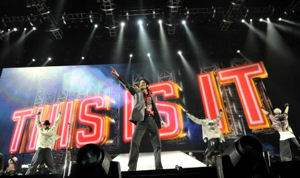|
Michael
Jackson's
This Is It
No matter what you think of Michael Jackson,
there's no doubt that his "final" concert tour, "This Is
It," would have been one hell of a show. So in terms of
show business, Michael Jackson's This Is It could
be considered a tragedy, as a legendary event now will never
happen. Jackson himself comes off slightly differently than
his show.
Putting aside a lifetime of bizarre behavior,
we can read a tragedy into the character of this entertainer
- a man who only truly understood life when he was in the
spotlight, becoming human at last in rehearsal footage caught
between public and private life. For fleeting moments, he's
not robotically perfect as an entertainer or hilariously
awkward hiding in plain sight. This is a Michael Jackson
we rarely saw, one who could get lost enjoying his own music,
smiling with genuine pleasure. It may sound odd to say,
but if Michael Jackson's This Is It captures a tragedy,
it's a joyous tragedy.
Then again, such contradictions pretty
much defined his whole life.
Largely taken from footage intended for
Jackson's own archives, the documentary doesn't quite capture
the process of putting together a show. By the time it gets
into full swing, most of the spectacle is well on its way
to realization. Occasionally, an interview segment will
point to something greater - an electric suit for "Billie
Jean" that Jackson never got to wear, an opening production
number that only exists in advanced animatic form but never
got rehearsed. That doesn't get commented upon, however.
These are all segments shot while Jackson was still alive,
all tinged with excitement. Director/producer Kenny Ortega
wisely keeps these from being encomiums; only the opening
and closing titles acknowledge the loss.
Instead, interviews with the dancers and
singers working on the show feel like video thank you cards
to Jackson, and probably would have been. Maybe they're
histrionic, but these people would have been part of an
historic entertainment event, so that can be forgiven. They
talk about his influence, but very much in a way thinking
that Jackson would hear them and know how grateful they
are.
And rehearsal footage genuinely shows how
grateful and gracious an entertainer Jackson was to them
in exchange. It's all rough, though well along in development.
Though impressive, the dancing isn't quite as precise as
it would have been on a show night, but at times Jackson
stops and turns to watch in admiration all the work going
on behind him.
Though the focus does stay on Jackson,
it's also easy to read in that - for him, anyway - he was
trying to pace himself and take it a little easier. He dances
with the ensemble, but lets them carry the absolute heaviest
of the loads. Since none of this was intended for public
release, he also marks a lot of the singing, dropping lines,
thinking through a number as he performs it and for the
most part trying to save his voice.
Yet sometimes he gets caught up and can't
hold back. He gets into a good-natured vocal battle on the
end of "I Just Can't Stop Loving You" with singer Judith
Hill that he's clearly enjoying, forgetting anyone else
is around. At the end he complains, "why do you make me
do that? I've got to save my voice…" then compliments Hill
and encourages her to keep it up. A bemused Ortega just
tells him, "you liked it, MJ."
And again, that's the difference. We've
seen the calculated performer, whose smiles in concert and
in public were more a triumph over his demons, fierce grins
pasted on. Here's the childlike pleasure that so many of
his friends - let's assume they really were - always said
he had.
Not that he comes off as child-like. As
many of the musicians comment, he was a perfectionist who
truly knew his music inside and out. What he didn't always
know was how to articulate himself, and there are a few
moments when he struggles not to lose his cool. They're
amusing in a way, as he tries to find the right metaphor
for what is wrong, and they hearken back to some of his
more bizarre public comments.
But the important thing there is that he
always treats everyone around with respect. Maybe that was
for the cameras, but it just doesn't seem to be the case.
Even if it was, there's no question he understood his power.
A favorite moment comes when Ortega starts to blow up at
the dancers for missing a cue, but Jackson quickly defends
them - no, they were waiting for him while he'd stopped
to sizzle for a bit. It's bizarre, but yes, perfectly true.
In a concert, Jackson would have sizzled.
The production numbers would have been
amazing. Ortega includes huge chunks of an updated "Thriller"
video that if I'm understanding correctly would have required
the audience to put on 3-D glasses. Updated make-up, a much
heavier influence from Disney's Haunted Mansion, and a huge
robot spider that carried Jackson around would have added
up to one dazzling spectacle.
Yet the simpler moments hold the most power.
Just Jackson singing, alone and with Hill, have to remind
his critics - and I consider myself one - that there was
something to him. The dancers all sit out on the floor,
just listening, sheer joy on their faces, disbelieving that
they get to be a small audience for this man.
There's still a touch of the bizarre here.
Footage seems to be culled from no more than four different
rehearsals, judging by the outfits Jackson wears. His fabled
face never quite looks the same from rehearsal to rehearsal,
and even his ears look like prosthetics on the big-screen
- this might be terrifying in IMAX. In practice, Jackson
also seems to favor padded suits that only accentuate that
in the last months of his life, he seems to have had the
same proportions as Jack Skellington. (Snarkiness aside,
I never realized what relatively huge hands the man had
until now.)
Some
of his improvisations as he works through the music are
a bit twee, as well as some of his ideas that probably would
have been included in a more polished concert film. It's
also hard not to read into his having to count off his brothers'
names in a brief tribute to his family.
No doubt, Jackson was bizarre. In life,
his attempts to combat that image backfired more than they
helped. With This Is It, though, he finally gets
to prove he was human.
|








